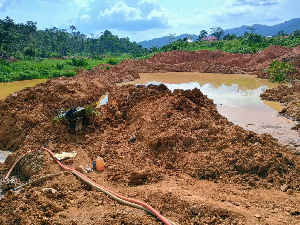Despite the easing of restrictions on movement as government fights to get the economy back on track following the outbreak of the novel coronavirus, the hospitality industry’s fortunes continue to plummet to further depths.
As Ghana’s borders remain shut, the oxygen that gives life to the hospitality industry—travellers—has been snuffed out.
The Ghana Hotels Association estimates that the travel, tourism and hospitality industry provides direct jobs to some 250,000 people in the country. A further 350,000 people owe their livelihoods indirectly to travel, tourism and hospitality businesses, which include more than 4,000 hotels spread across the country.
According to the president of the group, Dr. Edward Ackah-Nyameke Jnr., a good number of these jobs are hanging by a thread as these hotels remain shut down or are operating way below capacity.
“A lot of these hotels depend on tourists’ visitations; now borders have closed and international travel has stalled,” he said.
In Accra, Golden Tulip Hotel, a four-star accommodation barely three kilometers from Kotoka International Airport, epitomises the impact the COVID-19 pandemic is having on the hospitality industry.
The 238-room luxurious hotel’s minimum occupancy level in normal times is about 40 percent. But before it took the decision to shut down in March, occupancy had fallen to below 10 percent, according to the hotel’s Rooms Division Manager, Lucy Ahedor.
Apart from guests, mostly international travellers, not coming in because of the travel ban imposed by the government, the ban on social gatherings has meant that the hotel’s conferencing facilities have also been rendered redundant.
According to Ms. Ahedor, even before President Akufo-Addo announced a lockdown of Accra and Kumasi on March 30, which was to last three weeks, the management of the hotel had decided to close it due to low patronage as well as to protect their staff from contracting the virus.
Before the hotel closed, potential guests were turned away, and the few guests that were already staying transferred to nearby hotels that were still in operation at the time.
The hotel had to dig into its coffers to cater for the March salaries of more than 200 employees, and is putting in place contingency plans to pay future salaries should the downturn persist.
Golden Tulip is not the only big-name hotel that has halted its operations entirely as the country’s coronavirus case count surges. Other hotels like Labadi Beach, Accra City, and Holiday Inn have closed shop, with their workers’ fate uncertain and suppliers’ businesses reeling from the ramifications.
Rippling effects
Even though Central Region was not placed under a lockdown and its coronavirus case count remains below the national average, hotels there are not faring any better.
Located in the popular town of Pedu in Cape Coast, Nokaans is a small hotel with less than 20 guest rooms. The hotel has been feeling the pinch of the virus.
According to its owner, Benjamin Aidoo, although the hotel remains open, continuously declining patronage has meant that only three of the hotel’s workers are on duty, with the rest asked to go home until normalcy is restored.
Although the about 20 workers on Nokaans’ payroll received their full salaries in March, in April their salaries were cut by 25 percent. Mr. Aidoo signalled that if the situation does not improve, only the skeleton staff on duty will be paid in subsequent months.
“People are not coming in, but they can’t close down the hotel because they (the skeleton staff) live there. I have told them that if they can wait, fine, but coming May ending, I will not be able to pay them.”
With government planning a GH¢600m stimulus package for SMEs via its Coronavirus Alleviation Programme (CAP), Mr. Aidoo said he and other hoteliers would consider tapping into the package if the cost and repayment terms are favourable.
“If the interest rate on it is very low and the repayment is between two to three years and not a one-year loan facility, then I won’t mind applying for it.”
Comeback plans
Dr. Ackah-Nyameke Jnr. said the impact of the pandemic will cause serious challenges for hotels even after the virus has been dealt with.
“The hotels which have been shut down are going to incur a lot of costs in bringing their facilities back to operational levels. Even the staff, some are certainly going to look for other opportunities. And this would mean that by the time the hotels come back, [some of the staff] would not be interested [in their jobs anymore]. This would mean that hotels have to make fresh investment in training.”
While commending government’s stimulus package to aid businesses, he said the total cost of a bailout programme for the industry is difficult to estimate as the situation is still fluid.
He maintained that while hotels would do their bit to resume operations as early as possible, the government has the ultimate responsibility to stimulate economic activity that will support the industry’s comeback plans.
“Beyond that, we as an industry will look at marketing and also focus on promoting domestic tourism.” Boosting domestic tourism, he added, would require government to liaise with stakeholders to fix nagging challenges like access to tourists’ sites, safety, and other incentives that would encourage Ghanaians to take up regular travels to other parts of the country.
Business News of Thursday, 14 May 2020
Source: thebusiness24online.net













